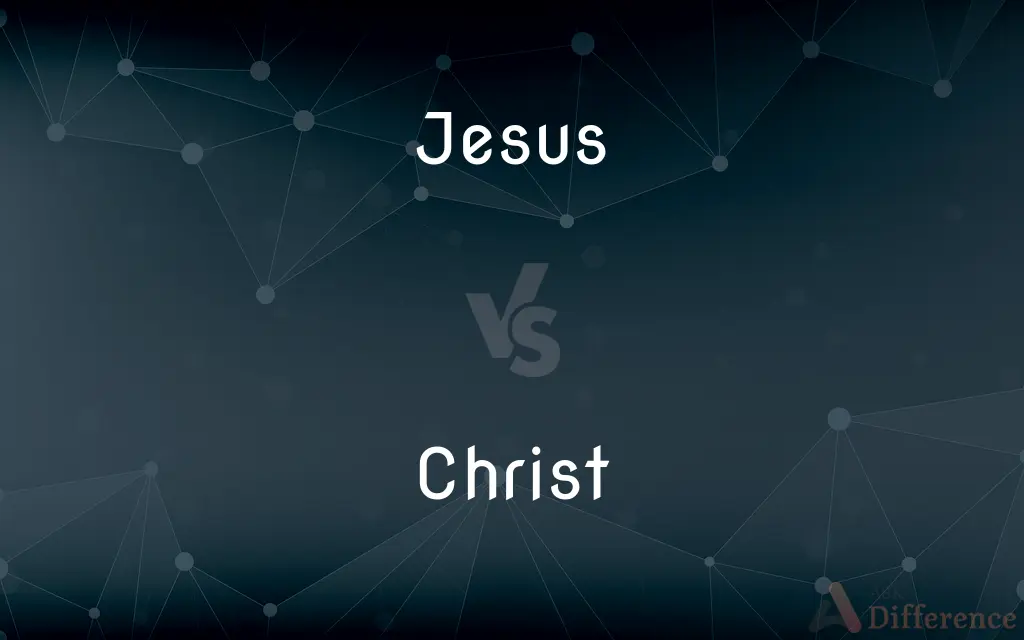Jesus vs. Christ — What's the Difference?
By Fiza Rafique & Urooj Arif — Updated on April 17, 2024
Jesus refers to the historical figure, a religious leader born in Bethlehem, whereas Christ is a title signifying "the anointed one" in Christianity, often used to denote his divine role.

Difference Between Jesus and Christ
Table of Contents
ADVERTISEMENT
Key Differences
Jesus, also known as Jesus of Nazareth, was a Galilean Jewish preacher and religious leader, whose life and teachings form the basis of Christianity. On the other hand, Christ is not a name but a title derived from the Greek word 'Christos', meaning 'anointed', which is the translation of the Hebrew term 'Messiah'.
Historically, Jesus was a real person who lived during the 1st century CE in regions of Judea and Galilee, now part of modern-day Israel and Palestine. Christ as a concept represents the fulfillment of the Old Testament prophecies about the Messiah who would lead and redeem the people of Israel.
Jesus' teachings focused on love, mercy, and forgiveness, and he is central to Christian faith for his actions, parables, and sermons. Whereas, the title Christ emphasizes his role as the prophesied savior and spiritual leader, fundamental to Christian belief in salvation and eternal life.
In the context of religious worship and identity, Jesus is often referred to personally by Christians as part of a relationship with a divine figure. In contrast, Christ is used to affirm his theological significance as the foundation of Christian faith, symbolizing his divine authority and mission.
The distinction is also important in theological discussions where "Jesus" refers to his human aspects and life on Earth, and "Christ" refers to his divine nature and role as the savior in Christian eschatology.
ADVERTISEMENT
Comparison Chart
Definition
Historical figure, religious leader
Title meaning "the anointed one"
Origin
Born in Bethlehem, lived in Judea and Galilee
Derived from Greek 'Christos', meaning anointed
Role in Christianity
Central figure of Christianity, teacher
Signifies messianic role, divine nature
Focus
His life, actions, and teachings
His spiritual and redemptive role
Theological Importance
Represents humanity and teachings
Represents divine mission and eschatology
Compare with Definitions
Jesus
A central figure in Christianity, believed to be the son of God and the savior of humanity.
Christians celebrate the birth of Jesus every year on Christmas.
Christ
A title signifying the anointed one, used to denote Jesus' divine role as the messiah.
The followers of Jesus recognized him as Christ after his resurrection.
Jesus
Often depicted as a compassionate and merciful leader in religious texts.
Jesus healed the sick and helped the poor during his ministry.
Christ
Used in various expressions of faith and creeds in Christianity.
The Nicene Creed affirms the belief in Jesus Christ as the Son of God.
Jesus
His life and teachings are documented in the New Testament of the Bible.
The Gospels of Matthew, Mark, Luke, and John recount the life of Jesus.
Christ
Theologically distinct from Jesus' human nature, focusing on his divine essence.
Christ's resurrection is celebrated as evidence of his divine nature and victory over death.
Jesus
Recognized for his parables and sermons, such as the Sermon on the Mount.
Jesus' Beatitudes offer profound moral teachings.
Christ
Represents the fulfillment of the messianic prophecies of the Old Testament.
Christ is seen as the promised deliverer of the Jewish people.
Jesus
Historically known as Jesus of Nazareth, a preacher and religious leader in ancient Judea.
Jesus taught his followers about love and forgiveness.
Christ
Central to Christian theology, symbolizing salvation and eternal life.
Belief in Christ is fundamental to achieving salvation according to Christian doctrine.
Jesus
Jesus (Greek: Ἰησοῦς, romanized: Iēsoûs, likely from Hebrew/Aramaic: יֵשׁוּעַ, romanized: Yēšūaʿ), c. 4 BC – AD 30 / 33, also referred to as Jesus of Nazareth or Jesus Christ, was a first-century Jewish preacher from Judea. He is the central figure of Christianity, the world's largest religion.
Christ
The Messiah, as foretold by the prophets of the Hebrew Scriptures. Often used with the.
Jesus
The central figure of the Christian religion.
Christ
Alternative form of Christ
False christs will offer false hope and provide no salvation.
Jesus
The Savior; the name of the Son of God as announced by the angel to his parents; the personal name of Our Lord, in distinction from Christ, his official appellation.
Thou shalt call his name Jesus; for he shall save his people from their sins.
Jesu, do thou my soul receive.
Christ
The Anointed; an appellation given to Jesus, the Savior. It is synonymous with the Hebrew Messiah.
Jesus
AD 29)
Christ
AD 29)
Christ
Any expected deliverer
Common Curiosities
How do the teachings of Jesus relate to his title as Christ?
Jesus' teachings lay the foundation for his recognition as Christ, embodying the qualities and actions expected of the Messiah.
What does it mean to believe in Jesus Christ?
Believing in Jesus Christ encompasses faith in his teachings, his death and resurrection, and his role as the savior.
Why is the resurrection important to Jesus' identity as Christ?
The resurrection is pivotal as it validates his divine nature and his prophesied role as the savior, according to Christian beliefs.
What is the difference between Jesus and Christ?
Jesus refers to the historical and human figure, while Christ denotes his divine role and title as the Messiah.
Why do people use the title Christ with Jesus?
The title "Christ" is used to acknowledge Jesus' role as the anointed savior and fulfiller of messianic prophecies.
How do historical and theological perspectives on Jesus differ?
Historical perspectives focus on Jesus' life and times, while theological perspectives emphasize his divine nature and salvific role as Christ.
Can the terms Jesus and Christ be used interchangeably?
While often used interchangeably in casual conversation, theologically they have distinct meanings emphasizing different aspects of his identity.
What are the implications of denying Jesus as Christ in Christianity?
Denying Jesus as Christ contradicts core Christian doctrines, which can lead to significant theological and denominational differences.
What significance does Jesus have in other religions?
In Islam, Jesus (known as Isa) is considered a prophet, not the son of God or the savior. Judaism recognizes Jesus as a historical figure but not as the Messiah.
How is the title of Christ important in Christian worship?
The title of Christ is central in worship, symbolizing his eternal authority and role in human salvation.
Share Your Discovery

Previous Comparison
Sunrise vs. Sunset
Next Comparison
Lexicology vs. MorphologyAuthor Spotlight
Written by
Fiza RafiqueFiza Rafique is a skilled content writer at AskDifference.com, where she meticulously refines and enhances written pieces. Drawing from her vast editorial expertise, Fiza ensures clarity, accuracy, and precision in every article. Passionate about language, she continually seeks to elevate the quality of content for readers worldwide.
Co-written by
Urooj ArifUrooj is a skilled content writer at Ask Difference, known for her exceptional ability to simplify complex topics into engaging and informative content. With a passion for research and a flair for clear, concise writing, she consistently delivers articles that resonate with our diverse audience.














































